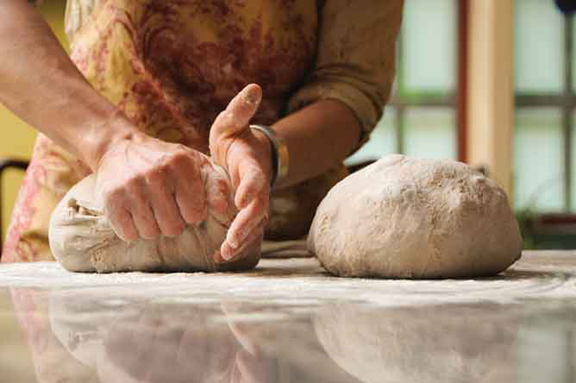July 6, 2011 - 9:10am

The Joys & Challenges of a Home-Based Food Business
In the United States many states have cottage laws which allow for home-based food businesses. In New York the Department of Agriculture & Markets has a home-processor exemption. There's an interesting article, "The Joys and Challenges of a Home-Based Food Business" in the Chronogram about Mor Pipman, owner of Much Mor Bread, a home-based artisan bread business. For those interested in starting up a business, she mentions how much she can bake and earn. While her main products are bread, she supplements her baking income with a few sweets. (Article by Peter Barrett, photo by Roy Gumpel.)



Greetings spongedaddy, more than half of the states in the US now have cottage laws that allow for home-based food businesses. However, every state has its own regulations. New York has a few quirks but it's relatively easy to get the free permit. And the regulations are decent enough that anyone can make a good income. If you decide to settle here and have any issues with getting started, contact me. Mimi at BakingFix dot com or visit my blog and website.
In the meantime, if you really want to get started, consider finding a commercial kitchen. Many social service organizations (churches, schools, VFWs, etc) have kitchens; plus restaurants and other eateries may rent space during their off hours. Good luck!
Fortunately Maine law allows to bake breads and some pastry from home. I was inspected, and pay $20/year for my license. I'm baking twice a week for a local natural food store, mostly European breads (some they want regularly and some baker's choice), and also have some people with a subscription (one or two loaves a week - whatever I bake). I enjoy myself hugely, and my customers are obviously very happy with my breads.
Of course, the output is not high enough to make serious money, but I don't have to do assembly line work, cover my costs, and have a little extra.
Karin
Our local council areas license home food production. The kitchen conditions for 'non-hazardous' foods like bread and plain cakes are pretty simple BUT we are inspected every year ( $100) and have to pay a permit fee ( $245 last year). I bake for one farmer's market a month and have a small 'subscription list' but the fees really cut into the profits.
Liz
Karin, your situation is close to ideal for dedicated bread bakers who want to bake for the enjoyment and are able to recoup costs. Do you make only slowrise breads or do you ever make other breads and pastries?
Mimifix, I like the slow rise breads, because I can do all the mixing the day before, and don't have to do the heavy stuff on baking day. The store needs my breads only by noon time, so I don't have to get up in the wee hours. All I have to do in the morning is taking out the (pre-portioned) dough (when I first wake up), shape the first batch (while making breakfast), and then bake the breads in succession (lowest temperature first, pitas at 550 F last) after breakfast. I'm usually done between 10 and 11 am, and deliver the breads between 11 and 12.
I used to sometimes bake vegan cupcakes, whoopie pies and fruit bars, too, but the store staff started baking some pastry on the premises, so they don't need it from me anymore.
You are right, this is a great way to enjoy your hobby, do something for the community (I prefer that to other volunteer work) and have a little extra pocket money. For tax purposes it's very practical, too, you can claim a lot of deductions.
Karin
Sorry my email address didn't print out on the prior entry. Instead, just google "Cottage Food Law FLorida" and you'll find links to it.
Bonni